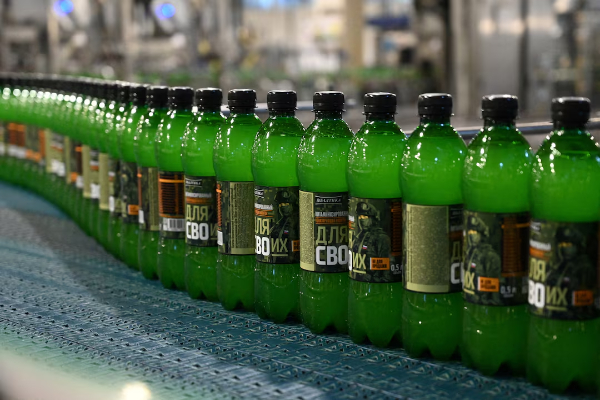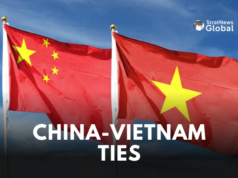
On a morning in October 2024, three men arrived at the Moscow headquarters of Glavprodukt, Russia’s largest canned food producer, and one introduced himself as the new director general, asserting that he would now be in charge.
According to the company’s founder and two sources familiar with the situation, the men were acting on behalf of Rosimushchestvo, Russia’s federal property management agency.
President Vladimir Putin had ordered that Glavprodukt, along with other assets ultimately owned by U.S. company Universal Beverage, be placed under Russia’s “temporary management,” effectively granting Moscow control over the company’s operations.
First US Firm Seizure
That fate has befallen around a dozen foreign companies, including Danish brewer Carlsberg and Finnish utility Fortum, since Russia invaded Ukraine in February 2022, but Glavprodukt was the first U.S.-owned business to come under Moscow’s control in this way.
U.S. President Donald Trump’s push for a rapid restoration of ties with Moscow, which would presumably entail a lifting of the economic sanctions the U.S. imposed in concert with other Western countries to punish Russia for its invasion of Ukraine, has encouraged speculation about the reversal of such measures.
Moscow has even said it expects U.S. companies to return to Russia imminently.
But none have yet announced plans to do so, and it is far from clear how Moscow might restore the confidence of traumatised Western investors, let alone restore any of their lost assets.
Seizure Of Foreign, Domestic Businesses
In fact, “temporary management” is one of several ways the state has sought to appropriate assets and redistribute them to regime loyalists, said Septimus Knox, Director, Disputes & Investigations, at risk consultancy S-RM.
It has not necessarily been good for business.
Glavprodukt’s new bosses have not only radically reconfigured the firm but also overseen a drop in sales, according to founder Leonid Smirnov.
“They have completely taken away my control of my company,” Smirnov told Reuters from Los Angeles. He has lived in the United States since fleeing the Soviet Union in the 1970s, but set up Glavprodukt in Russia in the late 1990s.
“A few weeks later, we were looking at Russia’s corporate registry online and saw that the owner had changed from us to a division of the Russian Federation. This ‘temporary change’ does not look so temporary.”
US State Dept ‘Aware’
The U.S. State Department said it was aware of Russia’s seizure of Glavprodukt. Rosimushchestvo did not respond to a request for comment.
The Russian assets of two European state-owned utilities, Fortum and Germany’s Uniper which both operate power plants in Russia, have been run by Moscow-installed executives for almost two years.
French yoghurt maker Danone and Danish brewer Carlsberg had their Russian assets seized and sales forced through to hand-picked buyers.
“There are no signs that this process can be reversed and, once a business enters it, its fate is more or less sealed,” said Knox.
The process is not restricted to Western companies, as the Russian state seizes more and more domestic assets through the courts. In January, a leading grain trader, Moscow’s sprawling Domodedovo airport and several strategic warehouses were all ceded to the state.
Furthermore, Russia has passed legislation that can identify U.S. property to use as compensation for losses related to its assets frozen overseas. A new law is being prepared that would widen that to other Western nations, sources told Reuters in February.
Western Firms’ Little Recourse
But Moscow’s existing legal arsenal is already potent.
Carlsberg announced it had agreed to sell its stake in Baltika Breweries to an undisclosed buyer in June 2023, but Russia intervened three weeks later with a Putin decree putting the assets into temporary management.
In December 2024, Carlsberg instead sold the stake to two longstanding employees in Russia for roughly $320 million, well below the market value.
The government installed its own layer of managers over the heads of the Carlsberg executives on day one of the temporary management, Carlsberg CEO Jacob Aarup-Andersen told Reuters.
“From that day on, we lost operational control.”
Carlsberg no longer had operational insight or access to accounts. “To all intents and purposes, we had lost the asset,” Aarup-Andersen said.
At Glavprodukt, output and sales have fallen around 10% since October and some suppliers and buyers have cut ties, according to a source familiar with the matter.
Office-wide meetings have stopped and yearly bonuses have not been paid, the source said. The new management has started consolidating Glavprodukt’s business lines, putting its three factories and around 1,000 employees under one chain of command.
Smirnov said he believed this was a ploy to ultimately force a sale at a knock-down price – a fate meted out to many of the Western firms who have decided to leave Russia in the last three years.
“When a company’s managers are appointed on the basis of their political capital rather than technical competence,” Knox said, “it is inevitable that the asset’s value and the quality of its operations will suffer.”
(With inputs from Reuters)




